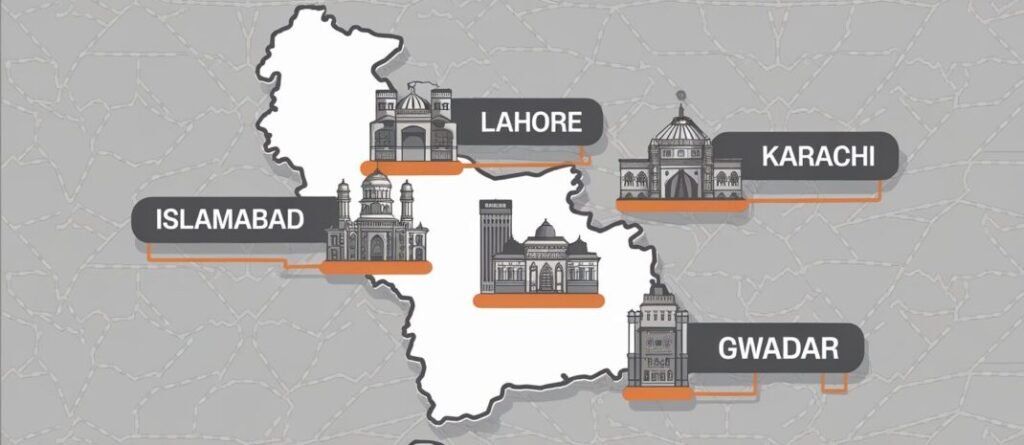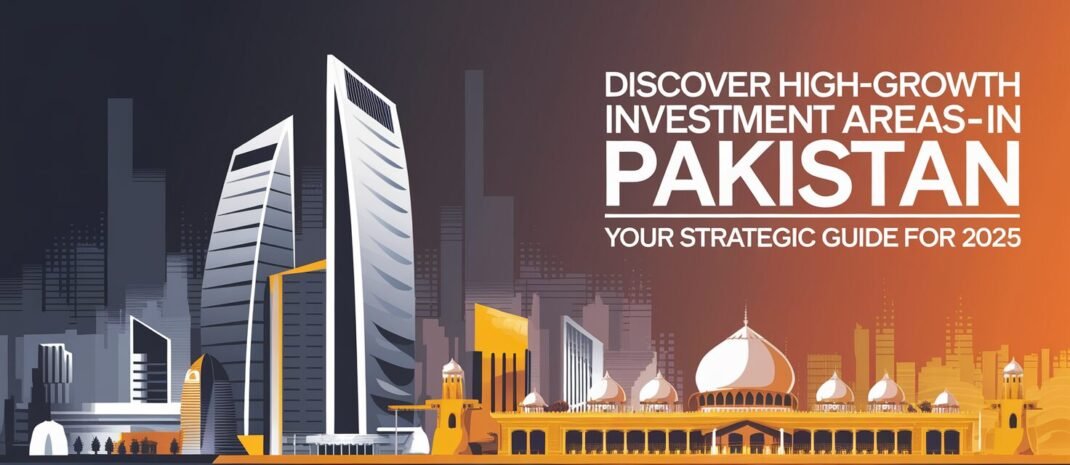Looking to tap into Pakistan’s dynamic investment landscape in 2025? The country’s evolving market presents a goldmine of opportunities for strategic investors seeking substantial returns. Pakistan’s investment landscape is experiencing unprecedented growth, with sectors like technology startups, real estate, and industrial development leading the charge. From Islamabad’s planned developments to Karachi’s commercial districts, and from innovative fintech solutions to revolutionary e-commerce platforms, the market is ripe with potential. Whether you’re a seasoned investor or just starting your investment journey, understanding where to put your money is crucial. In this comprehensive guide, we’ll explore the most promising investment areas across Pakistan, backed by market data and expert analysis. Let’s dive into the high-growth sectors and strategic locations that are reshaping Pakistan’s investment landscape for 2025.
Key Takeaways:
- – Real estate investments in major cities like Islamabad, Karachi, and Lahore present substantial growth potential, particularly in commercial properties and planned developments.
- – Pakistan’s startup ecosystem is experiencing rapid growth, with tech startups, fintech solutions, and e-commerce platforms leading the innovation wave.
- – Strategic locations in port cities and cultural capitals offer unique investment advantages, supported by robust infrastructure and increasing economic activity.
- – The technology sector shows promising returns, driven by a growing tech-savvy population and increasing mobile broadband users.
- – Foreign investment opportunities are expanding, with easier startup registration processes and high-potential deal flow in various sectors.
Pakistan’s Investment Landscape Overview
Pakistan’s investment landscape has undergone significant transformation, positioning itself as an emerging market with diverse opportunities. The country’s strategic location, young demographic dividend, and ongoing economic reforms create a compelling environment for both local and international investors.
Economic Indicators and Growth Potential
Pakistan’s economy shows promising signs with a GDP growth projection of 3.5% for 2025. The country’s large consumer base of 230 million people, coupled with increasing urbanization rates, creates substantial market opportunities. The middle class is expanding rapidly, driving consumer spending and investment in various sectors.
Key Investment Sectors
The technology sector has emerged as a frontrunner, with startups securing significant funding and revolutionizing traditional business models. Real estate continues to offer stable returns, particularly in major urban centers. The agricultural sector, backbone of Pakistan’s economy, presents modernization opportunities through tech integration.
Infrastructure Development
Major infrastructure projects, particularly under the China-Pakistan Economic Corridor (CPEC), are reshaping the investment landscape. These developments include modern transportation networks, energy projects, and special economic zones, creating new investment avenues across different regions.
Market Reforms and Regulations
Recent regulatory reforms have simplified business processes and improved investor protection. The Securities and Exchange Commission of Pakistan (SECP) has introduced measures to enhance transparency and ease of doing business. Digital banking initiatives are modernizing financial services, making transactions more efficient.
Investment Challenges and Opportunities
While macroeconomic challenges exist, including currency fluctuation and inflation, they’re balanced by significant opportunities in emerging sectors. The government’s focus on digital transformation and economic reforms presents unique prospects for early movers in various industries.
💡 Key Takeaway: Pakistan’s investment landscape in 2025 offers diverse opportunities across multiple sectors, supported by favorable demographics, infrastructure development, and regulatory reforms, despite existing economic challenges.
Prime Real Estate Investment Hotspots
Islamabad – The Capital’s Investment Appeal
Islamabad stands out as a prime investment destination, offering a unique blend of planned development and consistent value appreciation. The capital city’s real estate market has shown remarkable resilience, with property values increasing by 15-20% annually in prime locations like DHA, Bahria Town, and Gulberg Greens.
The city’s systematic development approach and modern infrastructure make it particularly attractive to both local and overseas investors. Areas like the E-11 sector and Blue Area continue to witness substantial commercial growth, with rental yields averaging 6-8% annually.
Lahore – Cultural Hub with Modern Development
Lahore’s real estate landscape combines historical charm with contemporary development. Premium housing societies like DHA, Lake City, and Park View City have emerged as investment hotspots. The city’s expanding Ring Road project has opened new investment corridors, particularly in areas like Raiwind Road and Multan Road.
Commercial properties in Gulberg and Johar Town have shown impressive capital appreciation rates of 12-15% annually. The city’s robust infrastructure development, including the Orange Line Metro, has significantly enhanced property values in connected areas.
Karachi – Commercial Capital’s Growth Zones
As Pakistan’s largest city, Karachi offers diverse investment opportunities across its expanding landscape. Areas like DHA City, Bahria Town, and Scheme 33 have become focal points for residential investment. The city’s commercial districts, particularly in SITE Area and Korangi Industrial Area, present lucrative opportunities with annual returns ranging from 8-10%.
The ongoing development of coastal areas and the completion of various infrastructure projects have created new investment corridors along the Northern Bypass and Super Highway.
Gwadar – Strategic Port City Investment
Gwadar represents Pakistan’s emerging investment frontier, driven by CPEC developments and its strategic port status. The Master Plan 2050 envisions Gwadar as a smart port city, creating substantial investment opportunities in both residential and commercial sectors.
Key areas like Gwadar Golf City and New Town Housing Scheme have shown potential for significant value appreciation. The ongoing development of the Gwadar Port Free Zone and industrial parks is expected to drive property values up by 25-30% in the next few years.

💡 Key Takeaway: Pakistan’s real estate market offers diverse investment opportunities across major cities, with Islamabad, Lahore, Karachi, and Gwadar emerging as prime locations offering strong growth potential and attractive returns for strategic investors.
Thriving Technology and Startup Ecosystem
Pakistan’s technology sector is experiencing remarkable growth, driven by a young, tech-savvy population and increasing digital adoption. With over 100 million mobile broadband users, the ecosystem presents compelling investment opportunities.
Digital Infrastructure Development
The country’s digital infrastructure has seen substantial improvements, with nationwide 4G coverage and ongoing 5G trials. Major telecom companies are investing heavily in network expansion, creating a robust foundation for tech startups and digital services.
Private sector investments in data centers and cloud services are accelerating, supporting the growth of local tech companies. This infrastructure development has attracted international tech giants, fostering knowledge transfer and innovation.
Startup Funding Landscape
Despite global economic challenges, Pakistani startups continue to attract significant investment. While funding peaked at $350 million in 2021, the ecosystem has matured towards sustainable growth models. Venture capital firms are increasingly focusing on startups with clear paths to profitability.
Local and international investors are particularly interested in fintech, e-commerce, and logistics sectors. The government’s initiatives, including tax incentives and special technology zones, have created a favorable environment for startup growth.
Success Stories and Market Validation
Several Pakistani startups have achieved remarkable success, validating the market’s potential. Notable examples include:
– Bazaar’s $70 million Series B funding and expansion to 500 cities
– NayaPay’s recognition in CB Insights’ 2024 Fintech 100
– Markaz Technologies’ reach across 300+ cities, enabling digital entrepreneurship
– PostEx’s innovative financial solutions serving 1.3 million consumers
Growth Sectors and Opportunities
The ecosystem shows particular promise in:
– Financial Technology
– E-commerce and Social Commerce
– Supply Chain Solutions
– Digital Healthcare
– EdTech Platforms
These sectors benefit from increasing smartphone penetration and growing digital literacy among Pakistan’s young population.
💡 Key Takeaway: Pakistan’s tech ecosystem offers significant investment potential, supported by improving digital infrastructure, maturing startup landscape, and successful market validation across multiple sectors, particularly in fintech and e-commerce.
Foreign Investment Opportunities
Pakistan’s evolving economic landscape presents numerous opportunities for foreign investors looking to tap into this emerging market. The country’s strategic location, young demographic, and ongoing economic reforms make it an attractive destination for international investment.
Strategic Economic Zones
Special Economic Zones (SEZs) across Pakistan offer foreign investors significant tax benefits and infrastructure support. These zones, particularly those aligned with the China-Pakistan Economic Corridor (CPEC), provide state-of-the-art facilities and streamlined business processes. Investors can enjoy tax holidays, duty-free import of machinery, and reduced regulatory requirements.
Technology and Digital Services
The burgeoning tech sector presents lucrative opportunities for foreign investment. With over 100 million mobile broadband users and a growing startup ecosystem, Pakistan’s digital economy is ripe for investment. Notable areas include:
– Fintech solutions and digital payment systems
– E-commerce platforms and logistics
– Software development and IT services
– Cloud computing infrastructure
Manufacturing and Industrial Sectors
Pakistan’s manufacturing sector offers competitive advantages through:
– Low labor costs and skilled workforce
– Access to raw materials
– Strategic location for exports
– Government incentives for foreign direct investment
Real Estate Development
The real estate sector welcomes foreign investment in:
– Commercial property development
– Industrial parks and warehousing
– Mixed-use urban developments
– Tourism infrastructure projects
Foreign investors can own 100% of real estate projects and enjoy significant returns in major cities like Islamabad, Lahore, and Karachi.
💡 Key Takeaway: Pakistan offers diverse investment opportunities across SEZs, technology, manufacturing, and real estate sectors, supported by favorable policies and a growing economy, making it an attractive destination for foreign investors in 2025.
Angel Investment Landscape
The angel investment ecosystem in Pakistan has witnessed remarkable growth, transforming from a nascent stage to a vibrant community of investors supporting innovative startups. This evolution has created numerous opportunities for both investors and entrepreneurs.
Current Market Dynamics
Pakistan’s angel investment landscape has expanded significantly, with over 50 active angel investors and networks operating across major cities. The market shows particular interest in tech-enabled solutions, fintech, and e-commerce ventures, reflecting global investment trends.
The average ticket size for angel investments ranges from $50,000 to $250,000, making it an accessible entry point for high-net-worth individuals looking to diversify their portfolios. Major hubs like Karachi, Lahore, and Islamabad lead in angel investment activities.
Key Investment Networks
Several prominent angel networks have emerged as catalysts for startup growth. The Pakistan Angel Investment Network (PAIN) and Karachi Angels have been instrumental in connecting investors with promising startups. These networks have facilitated deals worth millions of dollars, contributing to the ecosystem’s maturity.
Regulatory Framework
The Securities and Exchange Commission of Pakistan (SECP) has introduced favorable regulations for angel investors, including tax incentives and simplified investment procedures. This regulatory support has encouraged more individuals to participate in early-stage investments.
Sector-Specific Opportunities
Angel investors are showing increased interest in:
– Fintech solutions addressing financial inclusion
– E-commerce platforms targeting untapped markets
– Health-tech innovations
– EdTech solutions for Pakistan’s young population
– AgriTech ventures improving agricultural efficiency
💡 Key Takeaway: Pakistan’s angel investment landscape offers promising opportunities with growing networks, supportive regulations, and diverse sector-specific investments, making it an attractive market for early-stage investors in 2025.
Risk Assessment and Mitigation Strategies
Conducting thorough risk assessment is crucial before making any investment decisions in Pakistan’s dynamic market. Understanding potential risks and having solid mitigation strategies can help protect your investments and maximize returns.
Market Volatility Risks
The Pakistani market can experience significant fluctuations due to economic and political factors. Currency devaluation, inflation rates, and policy changes can impact investment values. Monitor economic indicators closely and diversify your investment portfolio across different sectors to minimize exposure.
Legal and Regulatory Challenges
Pakistan’s investment landscape involves complex regulatory frameworks. Stay updated with local laws, property regulations, and tax policies. Engage qualified legal professionals who understand both local and international investment laws to ensure compliance and protect your interests.
Infrastructure Development Risks
While many areas show promising growth, infrastructure development can be inconsistent. Research the development status of target locations, including utilities, transportation, and amenities. Focus on areas with established infrastructure or concrete development plans backed by government initiatives.
Security Considerations
Regional security situations can affect investment stability. Choose locations with strong security measures and established business communities. Consider investing in gated communities or commercial areas with proper security protocols.
Mitigation Through Due Diligence
Perform comprehensive market research and verify all documentation before making investments. Work with reputable real estate agents, conduct thorough property inspections, and maintain detailed records of all transactions. Consider partnering with local experts who understand market dynamics and can provide valuable insights.
💡 Key Takeaway: Successful investment in Pakistan requires careful risk assessment, thorough due diligence, and implementation of robust mitigation strategies across market, legal, infrastructure, and security aspects.
Emerging Investment Sectors
Technology and Digital Services
Pakistan’s tech sector is experiencing unprecedented growth, driven by a young, tech-savvy population and increasing digital adoption. The fintech industry has emerged as a particularly promising area, with companies like NayaPay and TAG revolutionizing digital banking services. Mobile payment solutions and e-commerce platforms are attracting significant investor attention.
E-commerce and Retail Tech
The retail technology landscape is transforming rapidly, with B2B marketplaces like Bazaar and Retailo leading the charge. These platforms are modernizing traditional retail operations through AI-driven inventory management and supply chain solutions. Social commerce platforms like Markaz Technologies are creating new opportunities for micro-entrepreneurs across Pakistan.
Real Estate Development
Modern housing projects and commercial developments are gaining momentum in major cities. Smart city initiatives and sustainable building practices are creating new investment opportunities. The sector is particularly attractive due to consistent value appreciation and the growing demand for modern living spaces.
Agriculture Technology
AgriTech is emerging as a high-potential sector, with startups introducing smart farming solutions and digital marketplaces for farmers. Investments in modern irrigation systems, precision agriculture, and farm-to-market platforms are showing promising returns. The sector benefits from Pakistan’s large agricultural base and increasing technology adoption.
Renewable Energy
The renewable energy sector presents significant investment potential, particularly in solar and wind power projects. Government incentives and the growing demand for sustainable energy solutions are driving sector growth. Small-scale solar installations and large utility projects both offer attractive investment opportunities.
💡 Key Takeaway: Pakistan’s emerging investment sectors are led by technology, e-commerce, real estate, agriculture, and renewable energy, offering diverse opportunities backed by digital transformation and sustainable development initiatives.
Read Also: National Job Portal (NJP) Pakistan: Your Gateway to Employment Opportunities
Conclusion
As Pakistan’s investment landscape continues to evolve, 2025 presents incredible opportunities across diverse sectors and strategic locations. From the thriving startup ecosystem in major cities to the consistent demand in real estate markets, the country offers compelling prospects for both local and overseas investors. Whether you’re drawn to Lahore’s rich cultural heritage and robust real estate market, Islamabad’s planned developments, or Karachi’s dynamic commercial properties, each city presents unique advantages for strategic investment. The growing tech-savvy population, increasing mobile broadband users, and expanding digital payment systems further strengthen Pakistan’s position as a high-potential investment destination. Take the first step towards building your investment portfolio in Pakistan’s promising market. Connect with local experts, explore various real estate segments, or engage with early-stage startups through angel investing. With proper research and strategic planning, you can capitalize on the incredible opportunities this emerging market offers while managing potential risks effectively.
FAQs
What are the minimum capital requirements for foreign investors looking to invest in Pakistan’s real estate market?
Foreign investors typically need a minimum investment of USD 50,000 to enter Pakistan’s real estate market. The process requires registration with the State Bank of Pakistan and compliance with the Foreign Exchange Regulation Act. However, requirements may vary based on the investment type and location.
How does Pakistan’s startup ecosystem compare to other emerging markets in Asia?
Pakistan’s startup ecosystem is rapidly growing, with a 300% increase in funding from 2020 to 2021. Compared to other Asian markets, Pakistan offers advantages like a large tech-savvy population, lower operational costs, and improving regulatory frameworks, making it increasingly attractive for angel investors.
What are the tax implications for overseas investors in Pakistan’s commercial properties?
Overseas investors must pay a 1% advance tax on property purchase, 2-4% capital gains tax (depending on holding period), and annual property tax. Additionally, rental income is taxed at progressive rates. It’s advisable to consult with local tax experts for detailed guidance.
How stable is Pakistan’s real estate market during economic fluctuations?
Pakistan’s real estate market has shown remarkable resilience during economic downturns. The consistent demand in major cities, particularly in high-demand areas, helps maintain property values. The market typically experiences 10-15% annual appreciation in prime locations despite economic challenges.
What role does technology play in Pakistan’s current investment landscape?
Technology is transforming Pakistan’s investment landscape through digital payment solutions, mobile apps for property transactions, and fintech platforms. With over 100 million mobile broadband users, tech integration is making investments more accessible and transparent for both local and foreign investors.
Are there any special economic zones (SEZs) that offer additional benefits to investors?
Pakistan’s SEZs offer attractive incentives including tax holidays for up to 10 years, 100% ownership rights, and duty-free import of capital goods. These zones are strategically located near major cities and ports, providing excellent infrastructure and connectivity for businesses.

